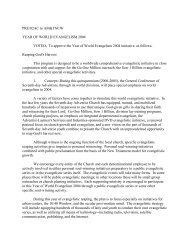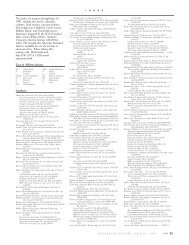Download PDF - Adventist Review
Download PDF - Adventist Review
Download PDF - Adventist Review
- No tags were found...
You also want an ePaper? Increase the reach of your titles
YUMPU automatically turns print PDFs into web optimized ePapers that Google loves.
<strong>Adventist</strong> Life<br />
BY PAMELA CONSUEGRA<br />
Parents in today’s technological<br />
age are dealing with<br />
issues that their parents<br />
never had to face. Social<br />
media is a cultural change<br />
that did not enter our world until the<br />
end of the last century—and it’s not a<br />
passing fad. Instead, it’s become the<br />
fabric of our American culture.<br />
As with many things, technology has<br />
proved to be both a blessing and a curse.<br />
We’ve witnessed ruling parties of nations<br />
overturned, in part, because of the influence<br />
social media had upon its citizens. If<br />
it can impact a nation, it surely has an<br />
impact upon our<br />
individual families.<br />
Many<br />
parents feel<br />
as if their<br />
attempts to<br />
control the<br />
use of media<br />
are futile.<br />
A recent study<br />
conducted by the<br />
Institute for<br />
Advanced Studies in<br />
Culture 1 revealed<br />
some startling<br />
information. Parents<br />
shared a view indicating<br />
that the family<br />
is in decline. This<br />
decline was attributed, to a large degree,<br />
to social media. Parents expressed a sense<br />
of danger to their child that was linked<br />
directly to the use of technology. Here are<br />
some of the findings the study revealed:<br />
• Eighty-four percent of teenagers<br />
carry a cell phone.<br />
• Ninety-three percent of teenagers<br />
are connected to their peers via cell<br />
phone or online social networking.<br />
• Seven out of 10 teenagers are texting<br />
at least once a day, and 64 percent<br />
are texting multiple times daily.<br />
• Four out of five teenagers have a<br />
Twitter, Facebook, or other social networking<br />
account with which they follow<br />
and “friend” people whom their<br />
parents don’t know.<br />
• Two thirds of teenagers connect<br />
to their online social networks at least<br />
several times a week.<br />
• Sixty-two percent of all parents of<br />
teenagers say their children “ are constantly<br />
connected electronically with<br />
their friends.”<br />
Another study indicates that the situation<br />
is actually worse than parents<br />
report. It shows a disconnect between<br />
parents’ perceptions and reality. “The<br />
Online Generation Gap: Contrasting Attitudes<br />
and Behaviors of Parents and<br />
Teens,” conducted by Hart Research Associates<br />
for the Family Online Safety Institute<br />
(FOSI), 2 found a “generation gap”<br />
between what parents think they know<br />
about their kids’ online behavior and<br />
what the teens say they actually do know.<br />
In short, this study revealed that parents<br />
think they have a better handle on their<br />
kids’ online behavior than they actually<br />
do. This means that the problem may be<br />
worse than parents think it is. In fact, 71<br />
percent of teens say they hide their<br />
online activity from their parents. 3<br />
Our children’s lives are infused with •<br />
contacts, conversations, and information<br />
that many parents feel are out of their control.<br />
Parents readily admit that their child<br />
sees things in media that they should not<br />
be seeing. Parents have a sense that they<br />
should, in fact, be doing more; however,<br />
they’re uncertain as to how to get a handle<br />
on social media and the digital world that<br />
has invaded their child’s life. Many parents<br />
feel as if their attempts to control the<br />
use of media are futile.<br />
If parents try to envelop their child<br />
in a safety net against the influences of<br />
social media, they are left with<br />
nowhere for their child to go. After all,<br />
social media is all around us. There’ s<br />
no escaping it. So should parents just<br />
admit defeat? Do we throw up our<br />
hands and give up?<br />
A key role of parenting is teaching<br />
our children to become responsible<br />
adults. This is not a matter of control;<br />
it’s a matter of living up to our Godgiven<br />
responsibility as parents. In so<br />
doing, we’ll help to ensure their safety<br />
amid social media frenzy.<br />
Here are some thoughts to consider:<br />
Install parental<br />
control software.<br />
Teens should never have accounts that<br />
don’t allow parents complete access. Noth-<br />
24 (840) | www.<strong>Adventist</strong><strong>Review</strong>.org | September 19, 2013
















